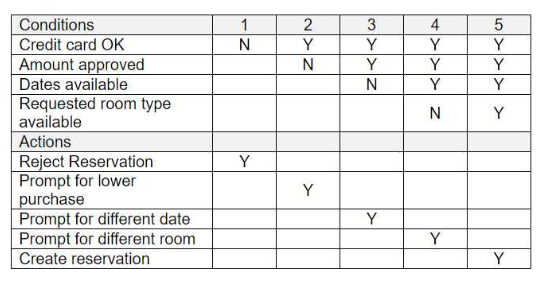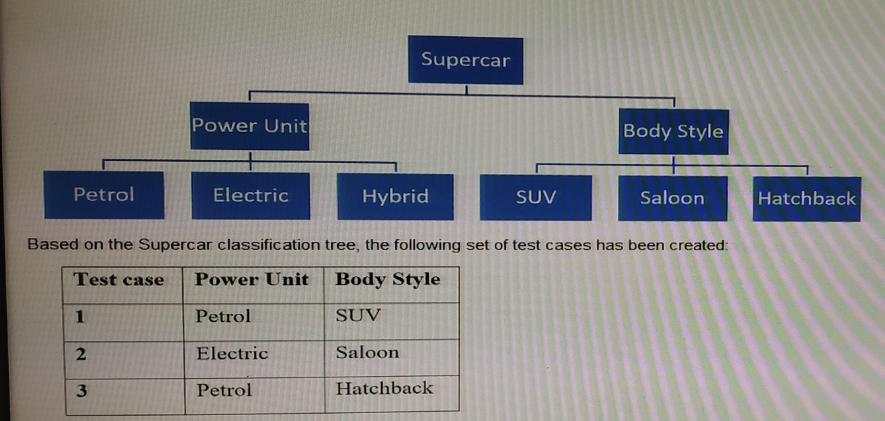At ValidExamDumps, we consistently monitor updates to the iSQI CTAL-TA_Syll2019 exam questions by iSQI. Whenever our team identifies changes in the exam questions,exam objectives, exam focus areas or in exam requirements, We immediately update our exam questions for both PDF and online practice exams. This commitment ensures our customers always have access to the most current and accurate questions. By preparing with these actual questions, our customers can successfully pass the iSQI ISTQB Certified Tester Advanced Level - Test Analyst (Syllabus 2019) exam on their first attempt without needing additional materials or study guides.
Other certification materials providers often include outdated or removed questions by iSQI in their iSQI CTAL-TA_Syll2019 exam. These outdated questions lead to customers failing their iSQI ISTQB Certified Tester Advanced Level - Test Analyst (Syllabus 2019) exam. In contrast, we ensure our questions bank includes only precise and up-to-date questions, guaranteeing their presence in your actual exam. Our main priority is your success in the iSQI CTAL-TA_Syll2019 exam, not profiting from selling obsolete exam questions in PDF or Online Practice Test.
The following decision table shows the conditions/actions that are handled by the current system regarding taking credit cards for reservations.

The customer has decided that credit cards are too high risk and wants to change to accepting only debit cards. Debit cards have to be valid and also require a valid PIN in order to be accepted. Debit cards require purchase amount approval in order to be accepted. Given these changes, how many test cases will be needed to provide 100% coverage of the decision table?
A decision table is a technique that shows the possible combinations of conditions and actions for a given problem. To achieve 100% coverage of the decision table, all the combinations of conditions must be tested. The decision table has four conditions: debit card valid, PIN valid, amount approved, and dates available. Each condition has two possible values: yes or no. Therefore, the number of test cases for the decision table is 2^4 = 16. However, some of these test cases are invalid or redundant, as they do not reflect the logic of the problem. For example, if the debit card is not valid, then the PIN and the amount are irrelevant. Similarly, if the PIN is not valid, then the amount is irrelevant. Therefore, these test cases can be eliminated from the decision table. After eliminating the invalid or redundant test cases, only eight test cases remain, as shown in the table below:
Table
Debit card valid
PIN valid
Amount approved
Dates available
Actions
No
No
No
No
Reject reservation
No
No
No
Yes
Reject reservation
No
No
Yes
No
Reject reservation
No
No
Yes
Yes
Reject reservation
Yes
No
No
No
Reject reservation
Yes
No
No
Yes
Reject reservation
Yes
No
Yes
No
Reject reservation
Yes
No
Yes
Yes
Reject reservation
Yes
Yes
No
No
Prompt for lower purchase
Yes
Yes
No
Yes
Prompt for lower purchase
Yes
Yes
Yes
No
Prompt for different date
Yes
Yes
Yes
Yes
Create reservation
Reference=
ISTQB Certified Tester Advanced Level Syllabus Technical Test Analyst1, page 2
Decision tables - IBM2, section ''Decision table overview''
You have been assigned to test an application that allows users to conduct banking online. You have been asked to verify the various installation environments for the product. According to the specification the product supports four browsers (Edge, Chrome, FireFox and Safari), three operating systems (Windows, Mac, Unix), and four languages (English, Spanish, French, German). As you are reviewing the specifications you realize that the actual operating system names and versions were not included, only the major category. From this, you conclude that if you pick one from each of these sets (for example, select Windows 10 for the Windows OS), that testing should be sufficient.
You have researched the product and determined that there should be no interaction between these three characteristics that would affect the operation of the system. However, you do want to exercise representative set of these options while conducting the other functional testing for the product.
If you decide to test pairs of combinations, how many combinations will you need to test?
Testing pairs of combinations is a technique that reduces the number of test cases by testing only two factors at a time, instead of testing all possible combinations. Testing pairs of combinations is based on the assumption that most defects are caused by interactions of at most two factors. Testing pairs of combinations can be applied to this problem using the installation environments, which are the browsers, the operating systems, and the languages. By using testing pairs of combinations, the number of test cases will be lower than exhaustive testing, which would require testing every combination of factors. The formula for calculating the number of test cases for testing pairs of combinations is:
N = P * (P - 1) / 2
where N is the number of test cases, and P is the number of values for each factor. In this problem, P is 4, as there are four browsers, four operating systems, and four languages. Therefore, the number of test cases for testing pairs of combinations is:
N = 4 * (4 - 1) / 2 N = 4 * 3 / 2 N = 12Reference=
ISTQB Certified Tester Advanced Level Syllabus Technical Test Analyst1, page 2
Pairwise Software Testing - GeeksforGeeks2, section ''Introduction''
Pairwise Testing: A Best Practice That Isn't3, section ''Pairwise Testing''
Supercar.
Supercar is an online vehicle sales website specializing in a single manufacturer's Sports Utility Vehicles (SUVs) and saloons A vehicle has two key elements, power unit and body style The manufacturer offers three choices of power unit: petrol, electric and hybrid There are 3 main body styles Saloon, Hatchback and SUV. SUVs are available only as petrol and electric options. Hybrid is available for Hatchback only The website will allow an order to be processed if the chosen vehicle configuration is in stock, otherwise a message will be displayed asking the user to Cry again later. Based on the specification, the following classification tree has been developed:

Which test case is needed to complete the test set and achieve minimum class coverage?
Consider the following use case for a "pick your dog" application called "Shelter Search".
1. The user enters his zip code
2. The user enters his breed choice
3. The system displays the list of shelters within a 30 mile radius of the user's zip code which have the selected breed
4. The user selects a shelter
5. The system displays the available appointment times for the next seven days
6. The user selects an appointment time
7. The system records the user's appointment
8. The system displays the address and phone number for the selected shelter
9. The system confirms the user's appointment
Alternate Paths:
1
a. The user cancels out
2a. The user doesn't find their choice
2b. The user enters their breed choice in the "other" text field
3a. No shelters are found with the selected breed
3b The user is prompted to enter a larger search radius
4a. The user cancels out
5a. There are no appointments available in the next seven days
5b. The user is asked if they want to search the next 30 days
6a. The user cancels out
7a. The system cannot record the appointment
7b. The system displays an error
8a. The system cannot display the address
8b. The system displays an error
How many test cases will be needed to achieve minimum coverage of this use case?
Which of the following is an example of an adaptability test that should be executed by a Test Analyst?
The correct answer is A. Execute test case A on iOS and Android (latest version) using FireFox (latest version).
Execute test case A on iOS and Android (latest version) using FireFox (latest version)
Reference =
ISTQB Certified Tester Advanced Level Syllabus Test Analyst2, Section 3.2.2 Adaptability
ISTQB Test Analyst Syllabus and Study Guide3, Section 3.2.2 Adaptability